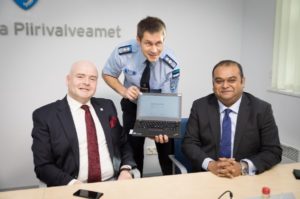E-Residency is a digital identity issued by the Republic of Estonia that provides the freedom to run a global EU business entirely online.
That provides a range of benefits to entrepreneurs around the world, but it also means that the growth of the programme is limited by where Estonia has Embassies and staff to issue the e-Residency digital identity cards.
Until now.
From December 2017, e-residents will be able to pick up their digital ID cards from the VFS Global Visa Application Center in Seoul, South Korea. Many countries partner with third party service providers to issue official documents and this is now the first pilot project to use one as an ‘e-Residency centre’. If successful, the project can be expanded to many more locations around the world where there is currently high demand for e-Residency, but difficulty reaching an existing pick up location.

Minister Andres Anvelt, Director General Elmar Vaher and Mr Prabuddha Sen with the digitally signed agreement.
The agreement was signed digitally (of course) this morning by Andres Anvelt, Estonia’s Minister of the Interior, Elmar Vaher, the Director General of the Estonian Police and Border Guard Board, and Prabuddha Sen, Regional Head CIS & Eastern Europe at VFS Global.
“E-Residency offers foreign citizens a secure access to Estonian e-services. We work towards making the application process as easy as possible, but we also want to make the issuing of the e-residents digital ID cards more convenient,”
said Elmar Vaher, Director General of the PBGB.
“This will be a pilot project, but if e-residents start using our update, then it may be possible that other visa application centers in the world can also hand out our digital ID cards. We are weighing an option that visa application centers can issue documents to the Estonian citizens in the future so that Estonians living around the world can comfortably receive their documents,”
said Vaher.
Andres Anvelt, Minister of the Interior said that the pilot project is an important step for e-Residency to become a global service.
Andres Anvelt
“We must develop the service and make Estonian legal system and economy attractive. South Korean partners were very interested in the co-operation. That gives us a chance to introduce Estonia’s e-state through e-Residency,”
said Anvelt.
He added that next year’s development of Automatic Biometric Identification System (ABIS) will be a very important step in helping e-residency to become a global service.
“Our identification systems are already secure, but work in that area will never end. We need to be proactive, not reactive, because it might be too late,”
said Anvelt.
The Estonian Police and Border Guard Board (PBGB) has issued 24 028 e-resident digital ID cards since the programme was launched.Their role is vital because e-Residency is a secure, government-issued digital identity that provides access to an open and transparent business environment for legitimate entrepreneurs. This enables e-residents to operate with greater trust and reach more opportunities online. We will keep you updated on the official launch in South Korea, but anyone in the world is welcome to apply today to join our new digital nation at e-resident.gov.ee.
This article first appeared on medium.com, Featured image via Pixabay










